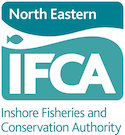Managing Sustainable Fisheries
Effective management of our inshore fisheries is of the upmost importance to ensure the success of the fishery and protect the marine environment. NEIFCA works alongside the local fishing industry and stakeholders to improve the sustainable management of commercial stocks within the district. Stock assessment and scientific research conducted by the NEIFCA’s Environmental Team is key in providing the data necessary to inform management decisions and develop new policies to improve the sustainability of the marine fisheries.
Section 153 of the Marine and Coastal Access Act, 2009 describes the role and responsibilities of Inshore Fisheries & Conservation Authorities.
-
The authority for an IFC district must manage the exploitation of sea fisheries resources in that district.
-
In performing its duty under subsection (1), the authority for an IFC district must —
-
seek to ensure that the exploitation of sea fisheries resources is carried out in a sustainable way,
-
seek to balance the social and economic benefits of exploiting the sea fisheries resources of the district with the need to protect the marine environment from, or promote its recovery from, the effects of such exploitation,
-
take any other steps which in the authority’s opinion are necessary or expedient for the purpose of making a contribution to the achievement of sustainable development, and
-
seek to balance the different needs of persons engaged in the exploitation of sea fisheries resources in the district.
Stock assessment
NEIFCA regularly conducts quayside sampling to collect biometric data on lobsters, crabs and king scallops. Data gathered from NEIFCA potting and scallop dredging surveys is used to complement the quayside biometric data collection providing a greater range in size classes which is essential for conducting a robust stock assessment. Annual stock assessment for crabs, lobsters and scallops is conducted by NEIFCA’s Environmental Team to identify the status of the inshore stocks within the North East district, however, these data gathered by NEIFCA is also shared with the Centre of Fisheries and Aquaculture Science (CEFAS) for inclusion within assessment of stock at a national level.
Policy
Inshore Fisheries & Conservation Officers are responsible for enforcing both regional and national legislation. Each IFCA district produces their own byelaws which are specific to the fisheries within their jurisdiction. Section 155 of the Marine and Coastal Access Act, 2009, describes the powers of IFCA’s to make byelaws.
-
For the purposes of performing the duty imposed by section 153 or the duty imposed by section 154, the authority for an IFC district may make byelaws for that district.
-
Byelaws made under this section must be observed within the district for which they are made.
-
A byelaw made under this section does not have effect until it is confirmed by the Secretary of State. This is subject to section 157 (emergency byelaws).
-
The Secretary of State may confirm a byelaw without modification or with such modifications as are agreed to by the IFC authority that made the byelaw.
-
Before confirming a byelaw, the Secretary of State may cause a local inquiry to be held.
Byelaws can be written to prohibit or restrict fishing activities spatially, temporally and specific to different species or habitats. These are important tools for IFCA’s to manage the inshore fisheries in a sustainable way.
NEIFCA byelaws can be found
here
.
